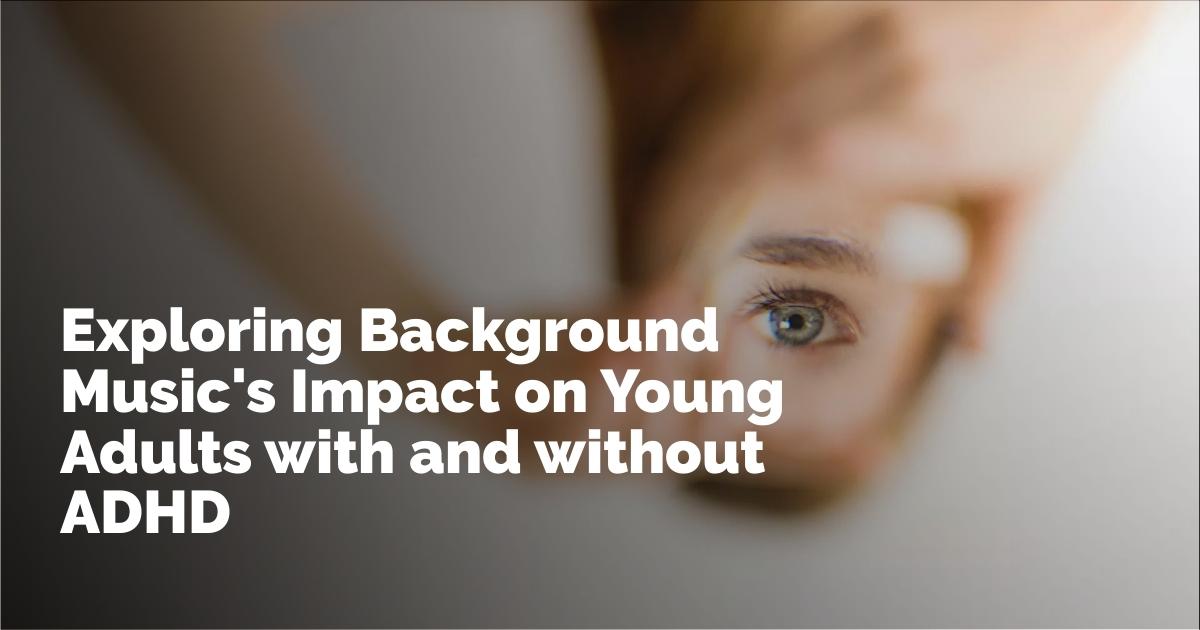Listening Habits and Effects of Background Music on Young Adults With and Without ADHD
In our modern world, music is a constant companion in our daily lives. It serves various roles, such as regulating emotions, improving concentration, and providing a pleasant background while we engage in different activities. A lot of research shows that music can have both positive and negative effects on cognitive tasks, such as studying or problem-solving. However, there's much less research on how young adults use background music in their daily routines, especially among those with Attention Deficit Hyperactivity Disorder (ADHD).
Background music (BM) is music that plays while the listener is focused on a primary task, like studying or working out. Studies have shown that music can affect different individuals in unique ways, depending on factors like their ability to focus, type of activity, and even the type of music itself. For instance, stimulating music might help some people remain engaged in a task, while for others, it could be distracting.
ADHD is a condition characterized by symptoms like inattentiveness, hyperactivity, and impulsivity. Though often diagnosed in childhood, these symptoms can persist into adulthood. Research on ADHD shows that individuals with ADHD might experience music differently because of how their brains process arousal and attention.
This study aimed to explore and compare how young adults with and without ADHD use background music during various activities, which range from highly cognitive tasks like studying to less demanding ones like cleaning or exercising. It involved an online survey of 434 young adults, aged between 17 and 30 years, with a mix of neurotypical individuals and those likely to have ADHD.
Music Preferences and ADHD
The study found significant differences in how individuals with ADHD and those without use background music. People with ADHD were found to listen to background music more frequently during both cognitive activities, such as studying and less cognitive activities, like exercising, compared to neurotypical individuals. Additionally, the ADHD group reported a stronger preference for stimulating music, regardless of the task at hand.
Interestingly, across both groups, most participants preferred relaxing, instrumental, and familiar music for more demanding cognitive tasks. On the other hand, during less cognitive activities, a preference for stimulating music with lyrics was observed.
Understanding the Role of Background Music in ADHD
ADHD affects the dopaminergic system in the brain, which is responsible for regulating motivation and reward. This system's dysfunction proposes that individuals with ADHD might use music as a non-pharmaceutical way to maintain optimal arousal levels, which in turn can improve their cognitive performance. Literature also suggests that music can help individuals with ADHD better regulate their emotional states, enhancing their mood through the pleasurable release of dopamine.
ADHD and Emotional Regulation Through Music
Music is widely recognized for its ability to induce emotions and can significantly impact mood and cognitive performance. Pleasant and stimulating tunes can enhance cognitive performance by affecting perceived emotional states. For those with ADHD, who often have heightened emotional sensitivity, music can play a critical role in both their emotional well-being and cognitive functioning.
The Mood Arousal Theory provides a framework to understand how music influences emotions and cognitive performance. Pleasant emotional arousal from music may increase cognitive performance, giving individuals with ADHD, in particular, a helpful tool for managing their symptoms.
Survey Insights
Participants and Their Listening Habits
In the survey, music listening habits were observed in two activity groups—cognitive (e.g., studying and writing) and less cognitive (e.g., cleaning and sports). An overwhelming majority reported listening to music during daily activities perceived to have positive effects on their tasks.
A total of 910 individuals participated, with 434 remaining after applying certain exclusion criteria. These were divided into neurotypical and ADHD-positive respondents based on scores from a widely used screening tool, the Adult ADHD Self-Report Screening Scale for DSM-5 (ASRS-5).
Musical Characteristics Preference
Participants showed distinct preferences for certain musical characteristics during different activities. For cognitive tasks, instrumental, relaxing, and familiar music were preferred. For less demanding tasks, stimulating music with lyrics was favored. This supports the idea that music serves not only to entertain but also to cater to cognitive and emotional needs, which vary based on activity type.
Effects on Cognitive and Emotional Functioning
The study assessed perceived effects of background music on cognition and emotion. It focused specifically on more demanding tasks to see how music influences concentration and mood. Different subjective effects on cognitive and emotional functioning were explored between neurotypical and ADHD-positive groups.
Cognitive Effects
As hypothesized, individuals identified with ADHD reported more negative impacts of background music on cognitive performance than their neurotypical counterparts. ADHD symptoms often include challenges with attentional control, explaining why background music might have a distracting effect during tasks requiring intense focus.
Emotional Effects
Contrary to its cognitive impact, music was found to have significant positive emotional effects, particularly for the ADHD group. People with ADHD reported that music improved their mood and helped manage emotional dysregulation. This aligns with the understanding of how ADHD involves a requirement for higher levels of arousal, which music can offer.
Conclusion
This comprehensive study confirms the diverse roles and perceived impacts of background music in young adults' lives, including those with ADHD. While music serves as a valuable tool for many in managing both emotional and cognitive tasks, it specifically offers ADHD individuals a strategy to cope with their challenges. However, the effects are not universal, and individual preferences and needs greatly influence outcomes.
The insights gained suggest that individuals, particularly those with ADHD, can benefit from tailoring their music choices to the nature of the task to optimize emotional and cognitive performance. Future research could further explore personalized music interventions as potential strategies for improving living and working conditions for those with attention-related challenges.
출처 : Original Source

